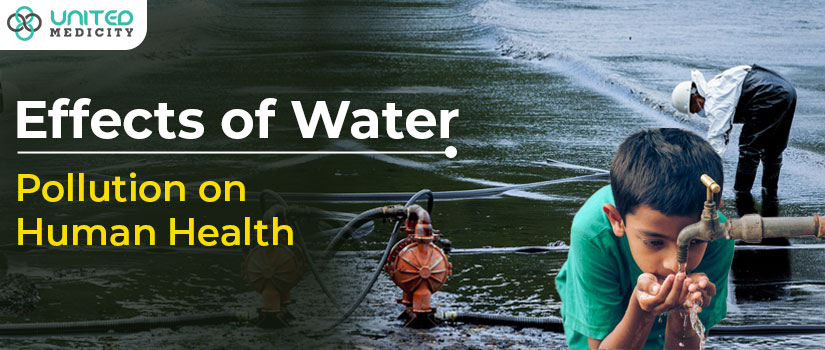Water, the elixir of life, sustains all living beings on Earth. However, the growing issue of water pollution has cast a shadow on this life-sustaining resource. The effects of water pollution on human health are significant and far-reaching, touching on various aspects of physical and mental well-being.
In this article, we delve into the detrimental effects of water pollution and explore potential solutions to mitigate its impact.
Effects of Water Pollution on Human Health
Water pollution occurs when contaminants are introduced into water bodies, rendering them unfit for consumption or other purposes. Human health can be severely compromised due to exposure to polluted water.
Let’s explore some of the prominent effects:
1 Antibiotic Resistance
One of the most serious issues about water pollution is the growth of antibiotic resistance. Antibiotics enter bodies of water and exert selection pressure on microorganisms, resulting in the evolution of antibiotic-resistant bacteria. These bacteria can then infect humans via contaminated water, food, or direct touch, rendering standard therapies ineffective and leading to more severe and persistent diseases.
2. Waterborne Diseases
One of the most common effects of water pollution on human health is WATERBORNE DISEASES. Contaminated water is a breeding ground for various pathogens, including bacteria, viruses, and parasites. Consumption or contact with such water can lead to illnesses like cholera, typhoid, dysentery, and hepatitis, causing severe diarrhea, vomiting, and even death in some cases.
3 Chemical Contaminants
Industrial and agricultural runoff, as well as improper disposal of chemicals, can introduce toxins like heavy metals (lead, mercury, arsenic) and pesticides into water sources. Prolonged exposure to these chemicals through contaminated water can lead to serious health issues, including, neurological disorders and even cancer.
4 Respiratory Problems
The effects of water pollution on human health can lead one towards respiratory problems. Polluted water can lead to the contamination of air as well. Water pollutants can evaporate and mix with air, causing respiratory problems when inhaled. This is especially true for volatile organic compounds (VOCs) and other air-water exchangeable pollutants.
5 Skin Disorders
Skin contact with polluted water can result in skin irritations, rashes, and other dermatological problems. Harmful chemicals and pathogens in water can disrupt the natural balance of the skin, leading to chronic skin conditions.
6 Reproductive and Developmental Issues
Exposure to certain water pollutants, such as endocrine-disrupting chemicals, can lead to reproductive problems and developmental disorders in children. These chemicals can interfere with hormonal balance and affect fertility and fetal development.
Potential Solutions
Addressing water pollution requires a multi-pronged approach that involves both preventive measures and remediation strategies:
- Proper disposal and treatment of industrial, agricultural, and household waste can significantly reduce the influx of contaminants into water bodies.
- Stringent regulations and policies that limit pollutant discharges into water bodies are essential. Government bodies and environmental agencies play a crucial role in enforcing these regulations.
- Industries and agricultural practices can adopt cleaner technologies and sustainable practices to minimize their impact on water quality.
- Educating communities about the importance of clean water and the risks of water pollution can lead to better conservation efforts and responsible water usage.
- Implementing advanced water treatment technologies, such as filtration, disinfection, and desalination, can help transform polluted water into safe drinking water.
Final Words!
In the tapestry of life, water is the thread that weaves every living entity together. However, the menace of water pollution has woven its own dark pattern, affecting the very essence of our existence. The effects of water pollution on human health are not isolated incidents but rather a complex web of consequences that ripple through our lives.
As we traverse this intricate web, it becomes evident that the solutions to mitigate the impact of water pollution require a symphony of efforts. The harmony of waste management, regulations, technological innovation, awareness, and water treatment must be orchestrated to create a future where clean water is a universal right, not a privilege.
In the heart of Prayagraj, a city steeped in history and culture, stands the beacon of modern healthcare, the United Medicity Hospital. Amidst the challenges posed by water pollution, the hospital shines as a sanctuary of health, offering not only medical care but also a testament to resilience. Through our commitment to healing, they reinforce the idea that progress is not only measured by the heights we achieve, but by the depths of compassion we extend to those in need.
In this journey towards a healthier future, let us each take up the mantle of responsibility. By choosing to be stewards of our environment, we can contribute to a world where the detriments of water pollution are mere echoes of the past. As we raise awareness, embrace sustainable practices, and advocate for change, we become a part of the solution. Together, we can rewrite the narrative, where the purity of water mirrors the vitality of our lives.
In closing, remember that every drop of clean water we preserve is a drop of hope for a brighter tomorrow. Just as the United Medicity Hospital in Prayagraj stands tall in its mission, let us stand united in our resolve to protect the well-being of ourselves, our communities, and our planet.

9 Comments
voXteZMOYcN March 20, 2024 at 1:01 pm
fjalxBKP
TPtuWvAGl July 5, 2024 at 1:04 am
VtigwQWrqnKNcsfT
uGtYsMaAxnw August 7, 2024 at 11:53 am
OFAxIJEwthQqySl
Lourdes February 10, 2025 at 2:35 am
Asking questions are really good thing if you are not understanding something fully, except this piece of wrjting offers pleasant understanding yet.
my web blog – Lourdes
lxbfYeaa March 13, 2025 at 9:21 am
555
lxbfYeaa-1 waitfor delay ‘0:0:15’ — March 13, 2025 at 9:22 am
555
lxbfYeaa March 13, 2025 at 9:26 am
555
lxbfYeaa March 13, 2025 at 9:27 am
555
lxbfYeaa March 13, 2025 at 9:27 am
555